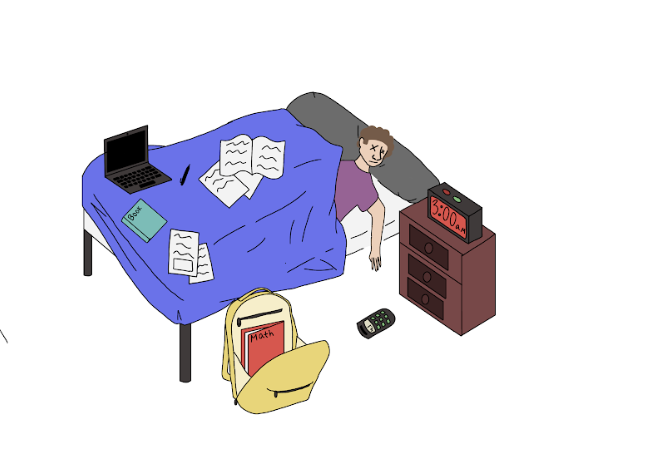Teenagers across the nation have been experiencing a trend regarding the low hours of sleep they are getting. According to the Nationwide Children’s hospital, on average, it’s estimated that teenagers get around 7 to 7.5 hours of sleep, but according to the CDC, teens need to be getting 8-10 hours of sleep daily. The consequences for not getting the recommended hours of sleep can include difficulty concentrating, moodiness, impaired memory, and can even cause the development of mental illnesses such as depression and anxiety. With increased workload many high schoolers are struggling to keep up with busy schedules.
It’s common for students to be involved in a sport or afterschool job that takes up most of their day, without accounting for the additional homework. Long hours are spent at night completing necessary material for the next day just to repeat the same routine. This leaves less time dedicated to the fun parts of highschool, and leaves very little time for sleep.
Reese Cordero is a freshman student athlete in the Biotechnology STEM pathway. She explained she only gets around four hours of sleep every night because the water polo season. Cordero said that the main reasons for her lack of sleep were sports and homework. The amount of homework she has even takes up her social interaction hours.
Many students a part of the sports programs the school offers. A large portion of these teams practice until late into the evening which causes the student to arrive home late. Not only is there work left to complete, but students are also fatigued from their workout.
English teacher Madeline Panacci sees students everyday with low-energy and no motivation.
“I think like most things, it’s systemic,” Panacci said. “Maybe the sleep cycles have been off or maybe it’s a result of the bad habits that have piled up since distance learning that makes it hard for students to manage their time.”
Students often complain that their amount of work is why they stay up so late finishing assignments.
“A lot of you [students] are getting four, six, eight hours of sleep, and that’s not healthy,” Principal Jennifer Larson said. “The combination of overcommitting and as a culture, how can we set reasonable expectations?”
When students are constantly on their devices, distracting notifications can veer them away from school work. Most of the school community believes that students should be getting more sleep but are struggling with this due to poor time management and several different academic and sports factors.
A survey regarding students’ sleep patterns shows just how many hours of sleep some students are getting and the likely causes. Many students have expressed that they are not getting enough sleep to function in an efficient way during classes. The most common reasons are a combination of large homework amounts, mental health issues, and distractions like television or social media. Specifically, around 32% of students struggle to balance homework and sleep, while 12% don’t sleep enough due to challenges with mental health.







































